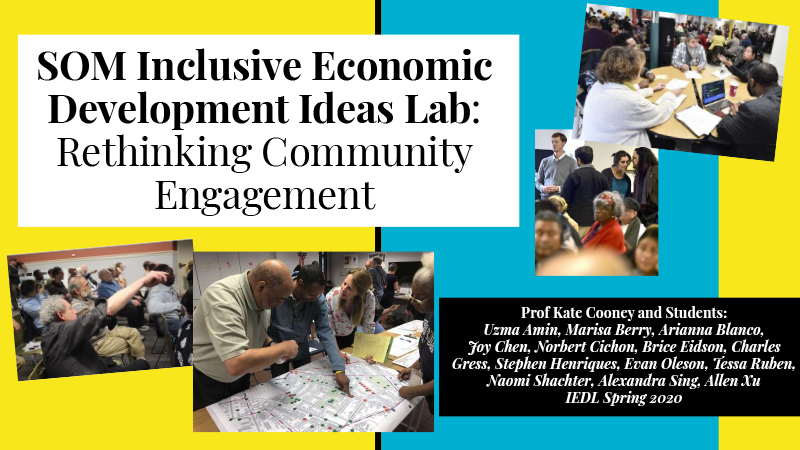IEDL 2020

Rethinking Community Engagement Lab Project
The 2020 IEDL project Rethinking Community Engagement: The Role of Narratives in Inclusive Economic Development was developed in conversation with Aicha Woods, Executive Director City Plan, and her team at City Plan to explore models of community engagement for inclusive economic development occuring nationally that might be useful in the New Haven region.
City of New Haven deliverable
The city deliverable for the IEDL Spring 2020 Lab is a presentation providing an overview of the key learnings from the Spring IEDL Lab. As an extension of this work, we have also been working on a series of preliminary “translational” research analyses for the New Haven context. These research components were begun by the Spring 2020 IEDL students and worked on further by Bryan Fike, SOM MBA 2020 through a summer internship supported by the Yale School of Management. The analyses developed by SOM students are available for use by all New Haven stakeholders, community members, city officials, nonprofit leaders, organizers, and all who might find them useful to push forward on the challenging work of creating a more racially and economically inclusive regional political economy.
Below are links to the Spring 2020 IEDL student recommendations for how the different modes of community engagement for inclusive economic development might translate to work in the domains of: affordable housing, education, and workforce development. Throughout the presentation there are broader set of recommendations offered for models of Community Engagement that could be used across domains.
The Yale SOM IEDL slidedeck on Rethinking Community Engagement includes the following sections:
1. Overview of the IEDL project (Slides 2-3)
2. Appreciative Inquiry and Community Engagement (Slides 4-10)
3. Cutting Edge Models for Community Engagement Across 6 Domains (Slides 11-72)
The full deck of the final report is available here.
Additional Analyses for translating spring iedl 2020 report findings to the New Haven region
Inclusive Economic Development Lab SOM summer intern, Bryan Fike worked on extending the empirical work begun by the students in the Spring Lab. Inspired by models of regional education models like the one in Louisville, Kentucky, the first set of calculations we did estimates how New Haven Public School funding could shift under a financial equalization model that pooled education funding regionally. In the second set of calculations, following the Louisville, Kentucky example, we built a model for redrawing educational district lines at a regional level to increase racial and economic integration for high school students in the South Central Connecticut region. Of note is that even in a very segregated metropolitan region, the district lines would not have to change that much to achieve a much more integrated experience for New Haven region’s public school students. In the arena of housing, taking the New Haven City’s Affordable Housing Task Force estimate that 25,000 units of affordable housing are needed to meet regional demand, we sketched out a pathway to 25,000 additional housing units using a mix of the housing policies discussed on the CitySCOPE podcast. Finally, inspired by the work of Jerry Rubin at JVS, David Dodson, at MDC, and James Johnson-Piett at Urbane Development, we prepared a preliminary set of workforce intermediary landscapes in select fields to be built upon, corrected and developed by regional actors in the workforce development space.
This series of reports is a preliminary set of empirical estimates offered as an initial exploration rather than a definitive proscription for action.
1. IEDL Report Spring 2020-Modeling Regional Approaches to Education (click here)
2. IEDL Report Spring 2020-Regional Housing Calculations-Getting to 25,000 Units (click here)
3. IEDL Report Spring 2020-Building a Regional Workforce Development System (click here)
IEDL Stakeholders
Thank you to those city stakeholders who attended our final presentation in May, 2020:
- Aicha Woods, City Plan, Executive Director
- Jenna Montesano, City Plan, Deputy Director of Zoning
- Stacey Davis, City Plan, Staff to City Plan Commission / Planner II
- Keith Lawrence, City of New Haven, Assistant Director of Comprehensive Planning / Director of Special Projects
- Kevin Alvarez, Mayor’s Office, Director of Legislative Affairs
- Omena McCoy, Mayor’s Office, Policy Assistant and Community Liaison
- Mike Piscitelli, New Haven Economic Development Administrator
- Adriane Jefferson, City of New Haven, Director of Arts and Cultural Affairs
Thanks also to those New Haven, Guilford and Madison residents, political figures, civil servants, local and community leaders who took the time to participate in the appreciative inquiry interviews with the Spring IEDL students regarding your Greater New Haven perspectives and experiences.